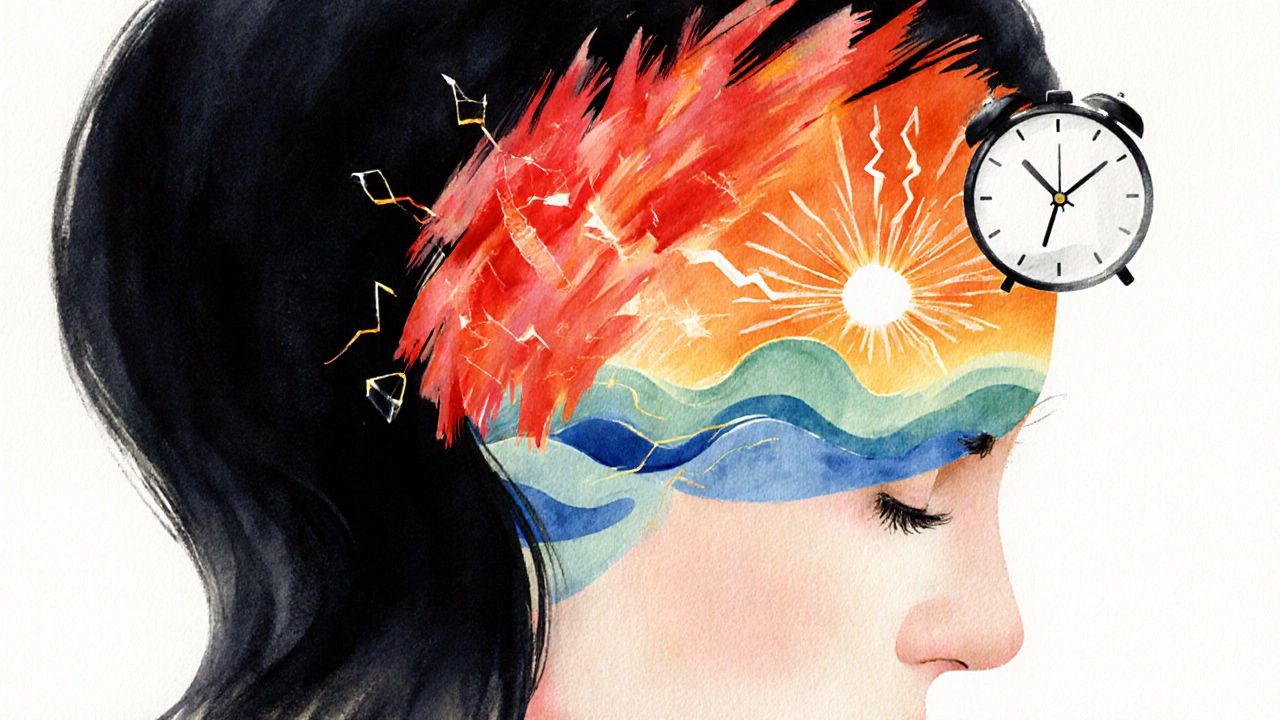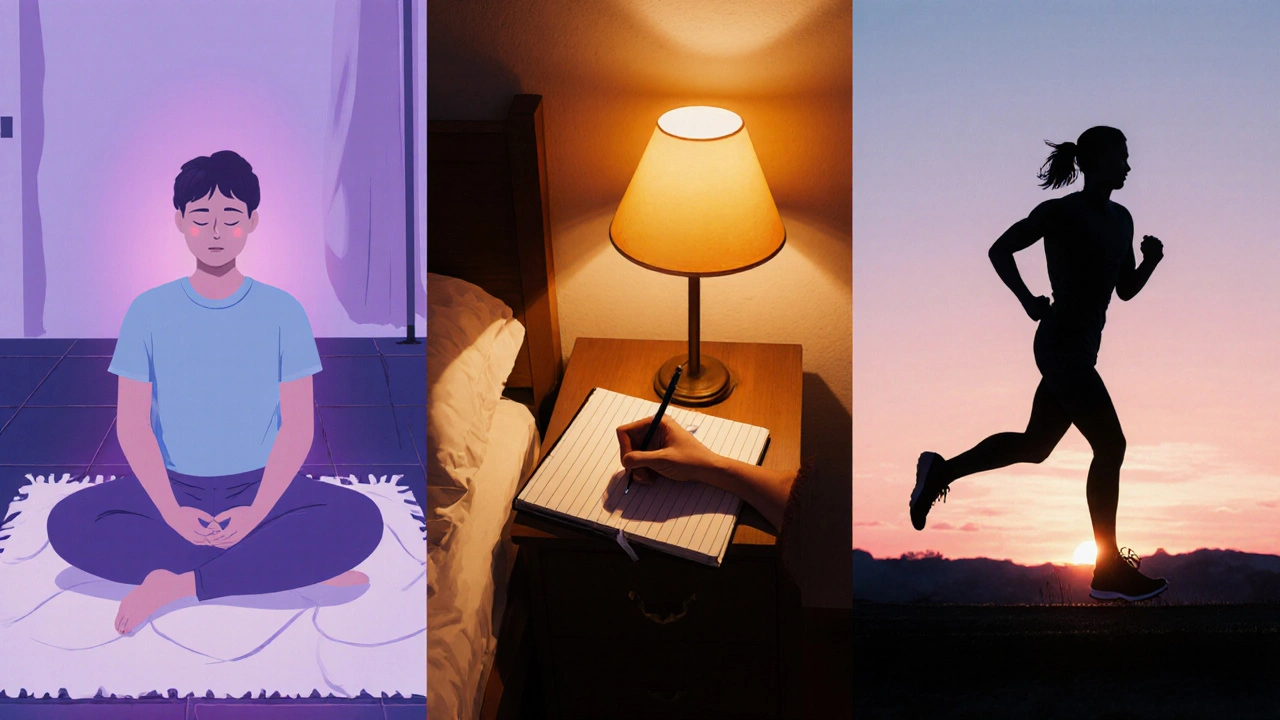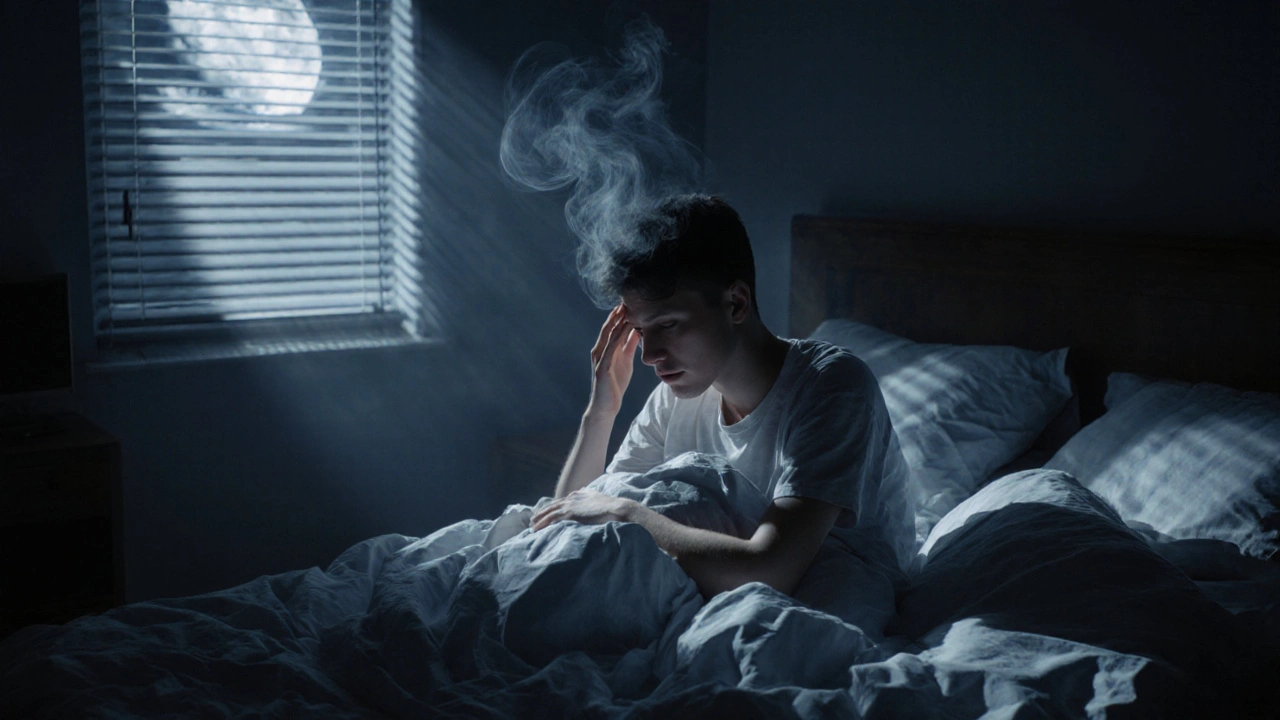Stress & Sleep Impact Calculator
Assess Your Stress-Sleep Connection
Answer the following questions to calculate your stress impact on sleep quality.
Your Stress-Sleep Impact Report
Ever tossed and turned while your mind replayed the day’s worries? You’re not alone-stress can yank away up to three hours of quality sleep each night. Understanding how stress and sleep interact is the first step to reclaiming restful nights.
Key Takeaways
- Stress triggers hormonal and nervous‑system changes that disrupt the sleep cycle.
- Insomnia, fragmented sleep, and early‑morning waking are the most common stress‑linked disorders.
- Mind‑body practices, regular exercise, and a consistent bedtime routine can cut stress‑related sleep loss by half.
- If stress‑driven insomnia lasts longer than three weeks, professional help like CBT‑I becomes essential.
How Stress Messes with Your Sleep
At its core, Stress is a physiological response to perceived threats, activating the hypothalamic‑pituitary‑adrenal (HPA) axis. This cascade releases cortisol, the "stress hormone," which peaks in the early morning and should dip at night. When stress stays high, cortisol remains elevated, signaling the brain that it’s still "on duty," making it hard to drift into the restorative stages of sleep.
The sympathetic nervous system also cranks up during stress, flooding the body with adrenaline. This state boosts heart rate and alertness-great for a quick sprint but disastrous for winding down before bed.
Sleep Disorders Most Often Fueled by Stress
Not every night of poor sleep means a chronic disorder, but chronic stress can tip the balance toward specific conditions:
- Insomnia: difficulty falling asleep, staying asleep, or waking up too early.
- Fragmented sleep: frequent awakenings that leave you feeling unrefreshed.
- Early‑morning awakening: the alarm clock isn’t the culprit; stress hormones push you out of bed.
- Nightmares and vivid dreams: anxiety amplifies REM‑stage activity.
Even conditions like restless leg syndrome or sleep‑disordered breathing can worsen under stress, because muscle tension and inflammation rise alongside cortisol.

Spotting Stress‑Related Sleep Problems
Before you dive into solutions, make sure stress is the primary driver. Ask yourself:
- Do I wake up with a racing mind or lingering anxiety?
- Is my sleep quality worse on work‑heavy or emotionally taxing days?
- Have I tried basic sleep hygiene (dark room, cool temperature) without improvement?
- Do physical symptoms-headaches, muscle tightness, or digestive upset-appear alongside poor sleep?
If you answered “yes” to most of these, stress is likely pulling the strings.
Stress Management Techniques That Actually Improve Sleep
Below is a quick‑look comparison of the most evidence‑backed stress‑relief methods and how they impact sleep latency, depth, and duration.
| Technique | Typical Time Needed | Effect on Sleep Latency | Impact on Sleep Quality | Best For |
|---|---|---|---|---|
| Mindfulness meditation | 10‑20min daily | ‑30% | Improves deep‑sleep proportion by 15% | Racing thoughts |
| Progressive muscle relaxation | 15min before bed | ‑25% | Reduces nighttime awakenings | Muscle tension |
| Regular aerobic exercise | 30‑45min, 3‑5×week | ‑20% | Increases REM efficiency | General stress |
| Journaling (brain‑dump) | 5‑10min nightly | ‑15% | Boosts sleep continuity | Overthinking |
| Cognitive‑behavioral therapy for insomnia (CBT‑I) | 6‑8 weekly sessions | ‑40% | Long‑term sleep quality gains | Chronic insomnia |
Pick one or two that fit your lifestyle and stick with them for at least three weeks before judging the results.
Daily Habits That Support Stress‑Free Sleep
Beyond dedicated relaxation sessions, everyday choices shape how stress interacts with your sleep architecture.
- Exercise wisely: Aim for morning or early‑afternoon cardio. Late‑night vigorous workouts can spike adrenaline and delay melatonin release.
- Control light exposure: Bright screens suppress melatonin. Use blue‑light filters after 7p.m. and dim lights an hour before bedtime.
- Watch caffeine and alcohol: Caffeine’s half‑life is about 5hours; avoid it after 2p.m. Alcohol may make you drowsy but fragments REM sleep later.
- Maintain a consistent circadian rhythm: Go to bed and wake up at the same time every day, even on weekends.
- Build a wind‑down routine: A 30‑minute buffer of reading, gentle stretching, or a warm shower signals your body it’s time to shift to "rest mode."

When to Call in the Professionals
If stress‑induced insomnia persists beyond three weeks, or if you notice severe daytime fatigue, mood swings, or reliance on sleeping pills, it’s time to seek expert help. A sleep specialist can rule out underlying medical conditions, while a therapist trained in CBT‑I can re‑wire the thought patterns that keep you up.
Medication should be a last resort and only under medical supervision. In many cases, a brief course of low‑dose melatonin combined with CBT‑I yields lasting results without the side effects of prescription hypnotics.
Quick Stress‑and‑Sleep Checklist
- Identify top three daily stressors and write them down before bed.
- Choose one relaxation technique (e.g., 10‑minute mindfulness) and practice it nightly.
- Schedule at least 30minutes of moderate exercise earlier in the day.
- Turn off screens or use blue‑light filters after 7p.m.
- Keep bedtime and wake‑time consistent - even on weekends.
- Review progress after two weeks; adjust technique or seek CBT‑I if no improvement.
Frequently Asked Questions
Can stress cause sleeplessness even if I’m not anxious?
Yes. Physical stressors like a demanding workload, chronic pain, or even caffeine overload trigger the same HPA‑axis response, raising cortisol and keeping the brain alert.
How long does it take for meditation to improve my sleep?
Most studies show noticeable reductions in sleep latency after 2‑3 weeks of daily 10‑minute sessions. Consistency beats length.
Is it okay to use over‑the‑counter sleep aids while I manage stress?
Short‑term use (up to two weeks) can help break a bad sleep pattern, but it doesn’t address the underlying stress. Relying on them long‑term can mask the problem and cause tolerance.
What’s the difference between CBT‑I and regular CBT?
CBT‑I zeroes in on sleep‑specific thoughts and habits, using sleep diaries, stimulus control, and sleep restriction. Regular CBT targets broader anxiety or depression, which may indirectly improve sleep but isn’t as focused.
Can diet affect stress‑related insomnia?
Absolutely. High‑sugar meals cause rapid spikes in blood glucose, followed by crashes that heighten cortisol. A balanced diet rich in omega‑3s, magnesium, and B‑vitamins supports a calmer nervous system.
Is it normal to wake up briefly during the night?
A short awakening (1‑2 minutes) is normal and usually doesn’t affect overall sleep quality. Problems arise when awakenings become frequent or last longer than 15 minutes.



Stress definitely messes with your sleep cycles.